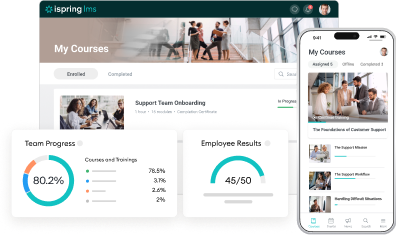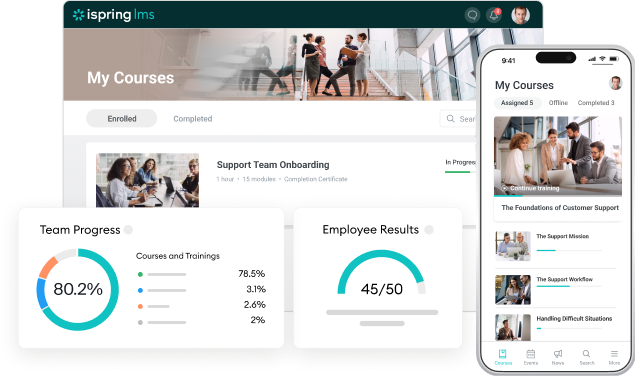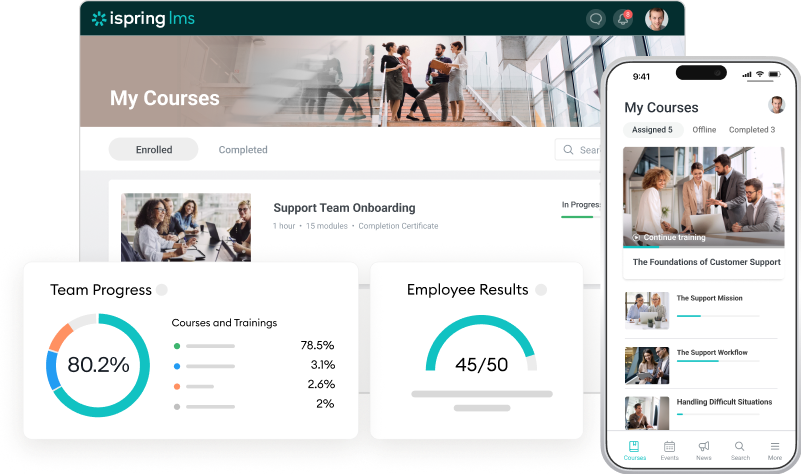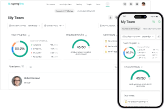The Top 5 HR LMS: Choosing the Best Solution

Digital learning is the perfect solution to streamlining employee training and professional development within an organization. Equipped with such platforms, HR professionals can work more effectively while ensuring that both current employees and new hires get the training opportunities they need to always stay on top of their game. Moreover, eLearning is much more cost-effective than traditional employee training.
However, not all learning management systems are equally suited for the HR department. If you’re thinking of adopting an HR LMS, read this article to learn more.
We’ll focus on LMS systems for HR departments and aspects to consider when choosing them. Plus, we’ll review a selection of the top LMS platforms. Let’s dive in.
LMS Applications in HR
A learning management system (LMS) is software for managing digital learning. In HR departments, such tools help speed up and streamline administrative tasks like onboarding, upskilling, compliance training, and certification. By doing so, they free up time and resources for HR departments while ensuring that each employee gets the most out of their training experiences and continues to meet their job demands. Moreover, an LMS for HR is the most practical way to handle employee upskilling, reskilling, and even soft skills training at scale.
Today, LMS platforms are popular with businesses of all sizes, as well as with educational institutions and nonprofit organizations. While they may have a lot in common, different learning management solutions have specific features you should be aware of to choose the right software. For example, some platforms are ideal for creating training courses but aren’t as great at reporting; some allow for certain integrations while others don’t, etc. If you haven’t had any experience with learning management systems yet, you might want to consult our starter guide on LMSs before moving forward.
Why Do HR Departments Need an LMS?
HR departments have always had a lot on their plate. On top of that, they are now expected to cater to employees’ growing training needs and meet their workplace expectations to keep them engaged and productive.
Today, providing opportunities for effective reskilling and upskilling is one of the top three business practices for improving talent availability worldwide. In some regions, this practice is even more important than offering higher wages. What is more, investing in learning and training on the job was named the #1 workforce strategy for the coming years in the Future of Jobs report by the World Economic Forum.
By adding learning management software to their set of HR tools, businesses can provide top-notch training resources and learning experiences to employees while meeting budgets and keeping the process manageable, even for smaller HR departments.
In the next section, we’ve compiled a list of the most important benefits of adopting an LMS for HR.
5 Ways an LMS Can Benefit Human Resources Departments
Every company has its own goals and requirements for employee training. But there are some that all of them have in common. Here are the advantages of using an LMS in HR that would be relevant for any organization.
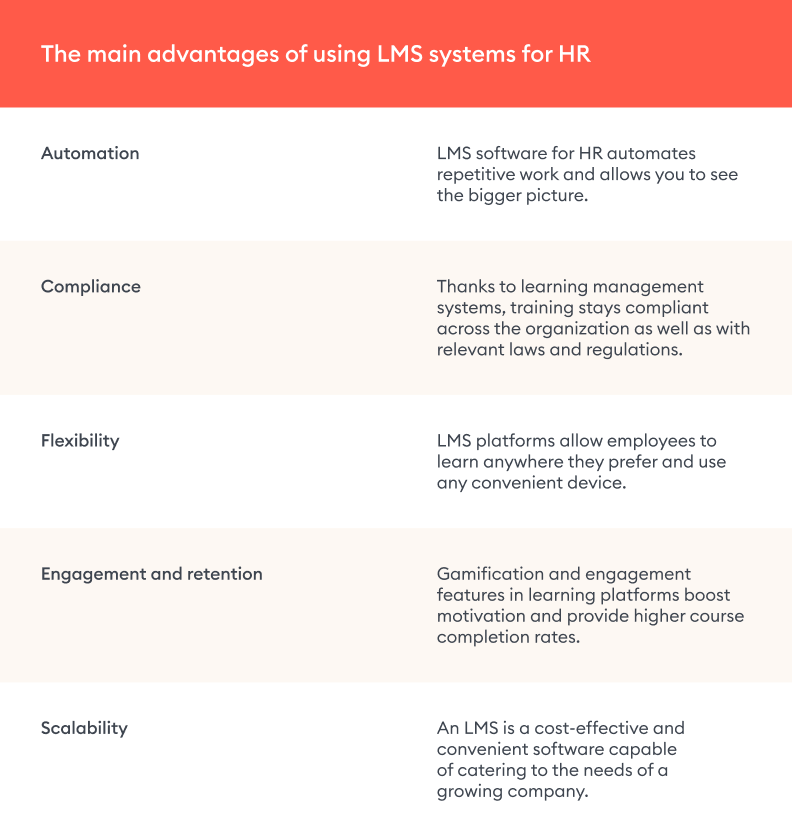
Now, let’s take a closer look at each of these points.
Advanced automation
An LMS HR system takes the bulk of routine work off the HR specialists’ shoulders. Automating administrative duties frees up time and allows human resources teams to focus on more strategic tasks, such as workforce planning and talent research, as well as on more creative work, such as producing better training and developing programs.
Guaranteed compliance
For larger companies, it is essential that staff training programs are mutually compliant, and adopting eLearning is the perfect way to ensure that. With a human resources LMS, companies can deliver customized training while also making sure it remains consistent across the organization and compliant with all relevant guidelines.
More flexibility
With an HR learning management system, you don’t need to gather people on-site in fixed hours. Instead, employees can organize their learning process as desired. Having the LMS platform at hand 24/7, thanks to mobile learning, they can access training materials from anywhere at any time that’s convenient, even when they are offline. With the LMS app installed on their mobile devices, they can easily study on the go — while commuting, for example.
Better employee engagement and retention
All the top LMS systems for HR have engagement features that make employee training more enjoyable and help improve knowledge retention. Interactive quizzes, badges, leaderboards, and the like help learners stay motivated and complete courses better and faster. Plus, you also get better employee retention because no one will want to leave an employer who can make learning a breeze.
Excellent scalability
Scaling up traditional employee training is expensive and entails a lot of organizational work. But with an HR LMS, you can train as many people as you need without much hassle: it only takes upgrading your plan to add more users and enroll them in all relevant courses. Thanks to automation, you can assign training programs, track employee progress, and handle all training management as easily as ever, regardless of the scale.
Core Features of HR LMS Systems to Consider
Learning management systems have a lot of features. However, not all of them are essential for HR professionals. Here’s a brief overview of the key factors to consider when choosing an LMS for HR.
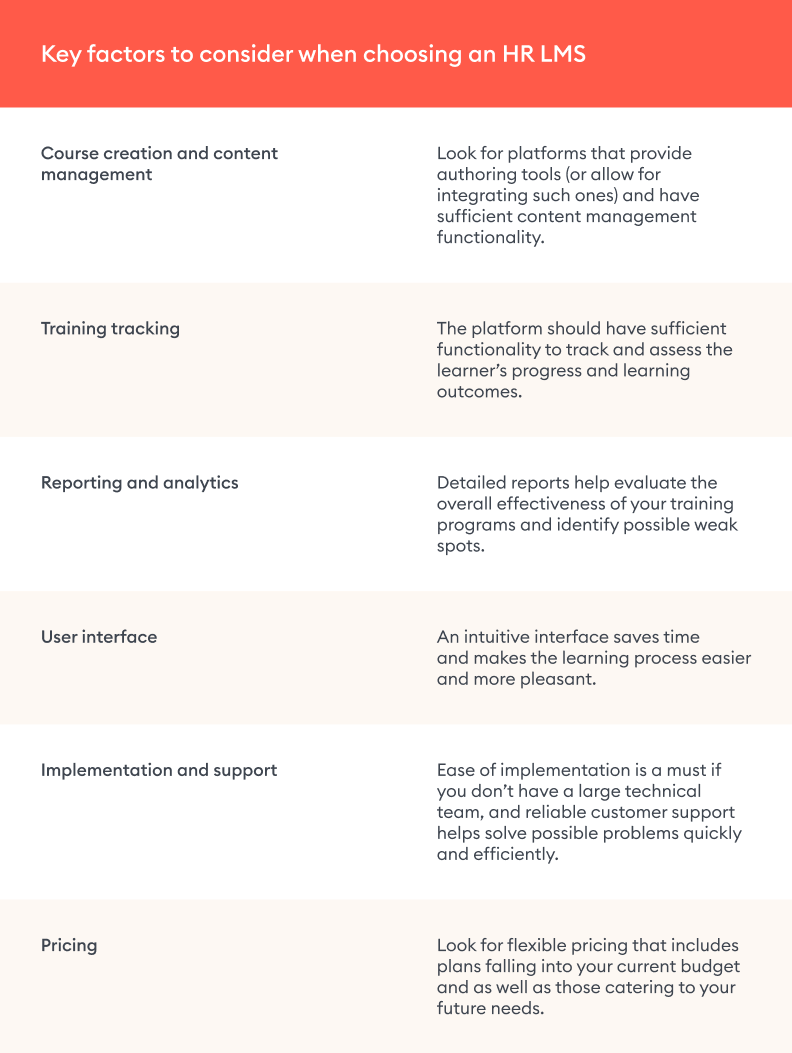
Now, let’s review each of them in more detail.
Course creation and content management capabilities
Every LMS can store content, but not all have sufficient course creation features. To produce custom courses, look for platforms that include training content creation tools or at least allow for integrating them. The options to create personalized learning paths according to an individualized employee training plan, import content in various formats, and compile a knowledge base will also come in handy.
Training tracking and assessment
Monitoring the training progress and assessing the outcomes is vital for understanding the effectiveness of your training and development programs. Although all LMSs for HR have tracking and assessment features, their functionality differs significantly. For example, some platforms focus on gamification, while others deliver more traditional experiences. So you can choose what suits you best, depending on how you prefer to track employee progress.
Reporting and analytics
Collecting and analyzing data on your learners’ performance and assessment results is a mammoth task, especially on a large scale. But a good LMS will do the job for you. For the best experience, look for platforms with detailed reporting and advanced analytics features. Additionally, some systems, such as iSpring LMS, provide nuanced reviews that help HRs tap even deeper into each employee’s performance.
User-friendly interface and personalization
Even the best training materials won’t be attractive if the platform isn’t easy to use. An intuitive interface will save time and provide better results by making the completion of training programs as technically simple as possible. Also, a personalized interface can help because any process is more convenient when you can arrange things as desired.
Ease of implementation and customer support
Some LMS systems are more difficult to implement than others. When the pros outweigh this con, that might not be a problem, but easy implementation is still preferable. For that reason, reliable customer support is a must-have for any complex software, LMS systems included. And of course, complicated implementation with a lack of sufficient support is a combination to avoid.
Pricing
Last but not least, pricing is a major point to consider. Most learning management systems offer flexible plans that depend on the number of active users and the features you choose. But pricing also varies greatly across platforms, so make sure you compare plans to get the most value for your money. Also, remember the need to scale up in the future.
Next, we’ll review some of the best LMS systems for HR currently available on the market.
5 Best HR LMS Systems to Explore
1. iSpring LMS
iSpring LMS is an award-winning learning management system that is perfectly suited for employee training and development in small and mid-sized organizations. The LMS has an intuitive interface and provides a comprehensive set of eLearning capabilities for effective staff training and assessment, from content creation and distribution to testing and analytics.
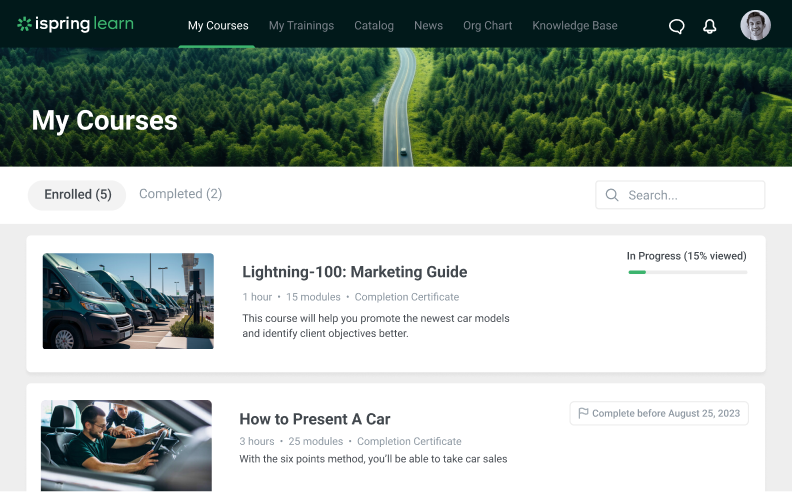
With iSpring LMS, you can easily automate routine tasks, such as managing users, tracking progress, and evaluating the outcomes, and use AI to facilitate processes like creating learning materials. The LMS also offers advanced learning customization, gamification features, and certification.
For a deeper insight into each employee’s performance, there is a powerful performance appraisal tool, and its blended learning capabilities are stellar.
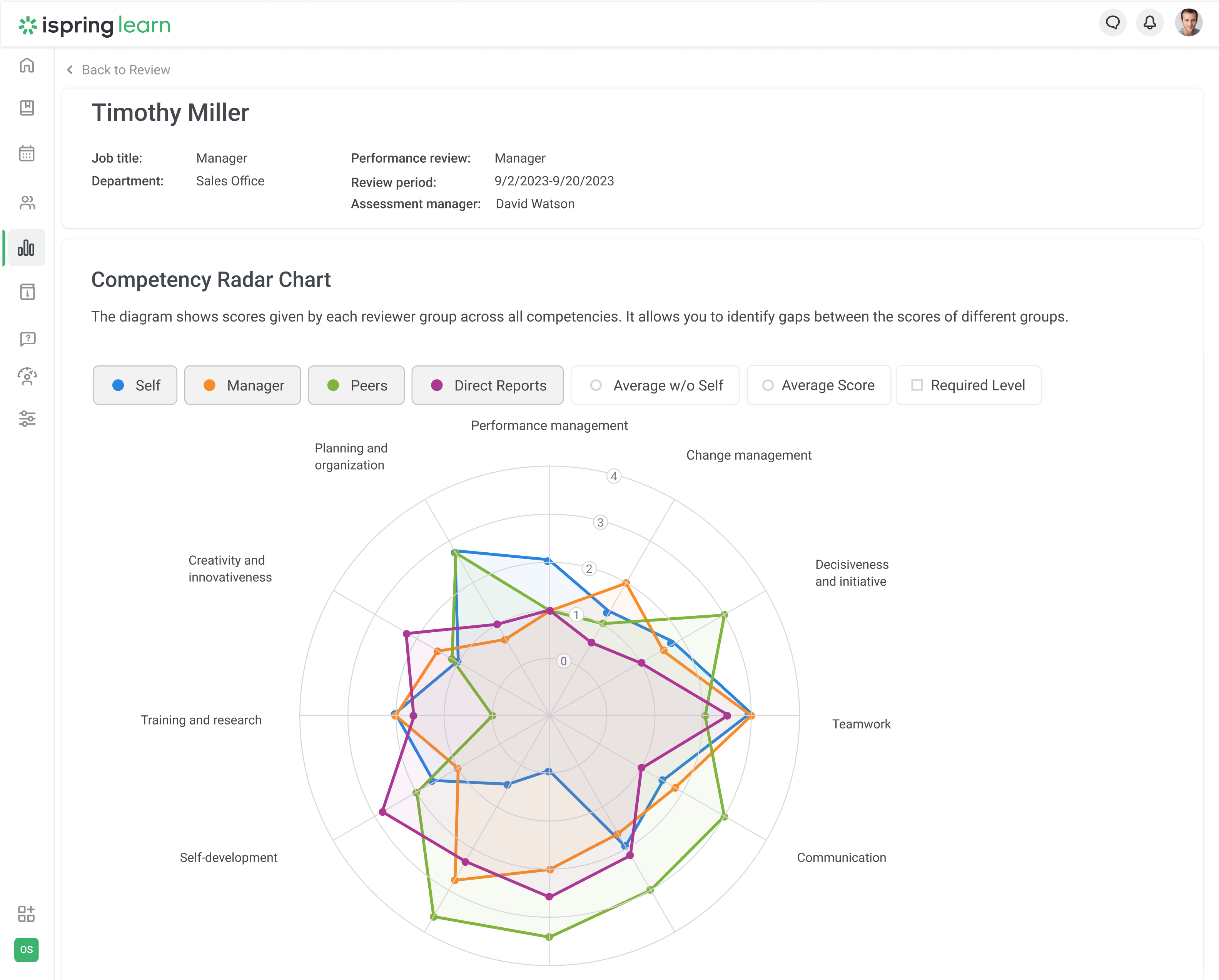
Moreover, the platform is remarkably affordable, with pricing plans starting at $4.46 USD per active user per month and a free trial offer. All this makes it one of the leading human resources LMSs on the market.
What are the pros
of this HR LMS?
- Easy-to-use, beginner-friendly interface
- Quick and simple AI-assisted course creation with the powerful bundled authoring tool
- Robust assessment, reporting, and review features
- Corporate knowledge base with custom access policies
- Free 30-day trial available without providing any card credentials, free demo, transparent pricing
- 24/7 live customer support
What are the cons
of this HR LMS?
- Doesn’t support some eLearning specifications (PEN, LTI)
Pricing
The specific pricing depends on which of the two plans you go with and the number of users needed. The Business plan for 300 users, for example, costs $4.46 USD per user per month if billed annually. Plus, a 30-day trial period is available.
2. Absorb LMS
Absorb LMS is a popular human resource learning management system with a focus on big enterprises, but is also suitable for smaller businesses. The platform offers all the essential features an HR LMS must have, such as user management, course creation capabilities, assessment, and reporting, plus functionality for external training.
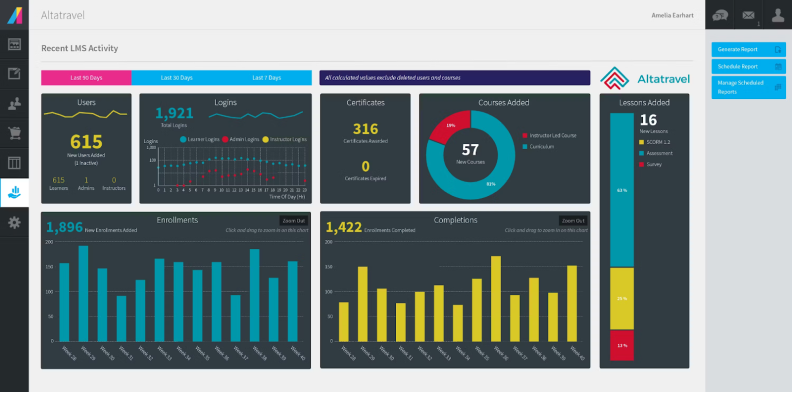
On top of that, Absorb offers rich AI functionality to help accelerate processes from creating training materials to search assistance and recommendations. Another highlight is the so-called social learning feature, which helps increase learner engagement. Other essential features are also present. However, some companies might find the LMS overstaffed with unnecessary features.
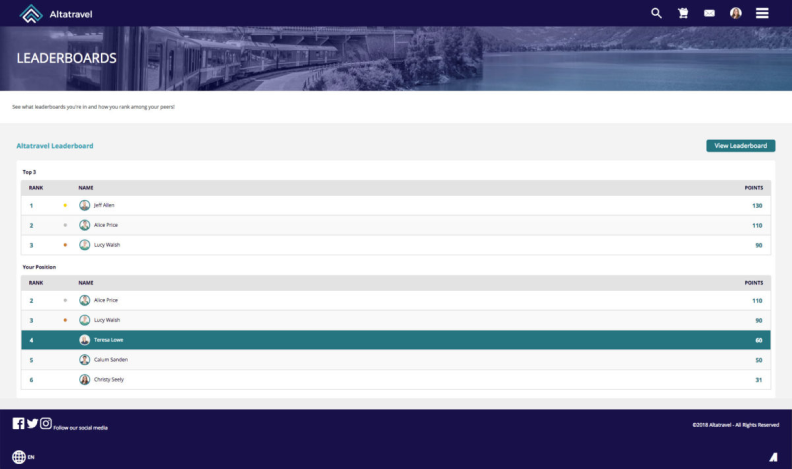
Moreover, pricing plans are not readily available. As with most such platforms, Absorb’s pricing depends on the features required and the number of users — but there is no reference point provided, so you can only get details upon request. The good news, however, is that registration for the free trial is available directly on the website.
What are the pros
of this HR LMS?
- Attractive and highly customizable design
- Easy content creation with the built-in tool
- A wealth of engagement and AI features
- Free trial and demo available
- Reliable customer support
What are the cons
of this HR LMS?
- Many users say that the platform’s interface is not very user-friendly
- Pricing is it not shown online and is only available upon request
Pricing
Absorb LMS offers custom, flexible pricing depending on the number of active learners. Detailed information is only available upon request.
3. eloomi
eloomi is a user-friendly learning management system that best caters to the needs of small and mid-sized companies. Since the platform was recently acquired by Dayforce and is now available as part of the Dayforce HCM bundle, its further development will probably be highly focused on HR goals in employee training.
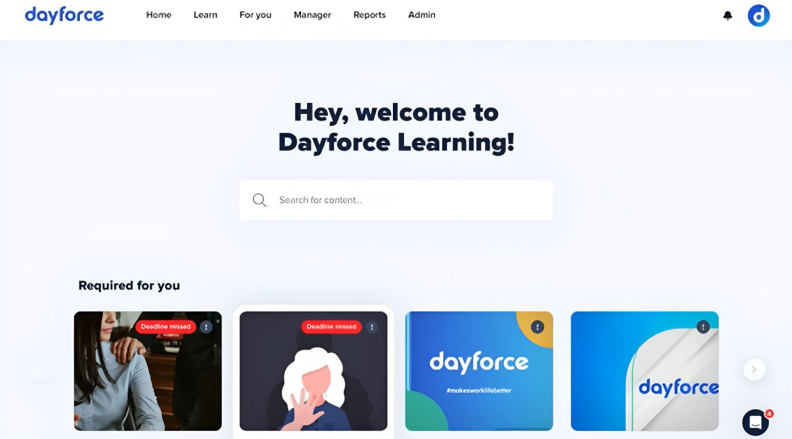
Some highlights of this LMS include an intuitive interface that is easy to navigate, even for users lacking technical skills. The platform also boasts a convenient AI-powered course builder, advanced customization, skills mapping and profiles, and powerful engagement. Like other top LMSs, the system also provides detailed reports and analytics, blended learning capabilities, and certification.
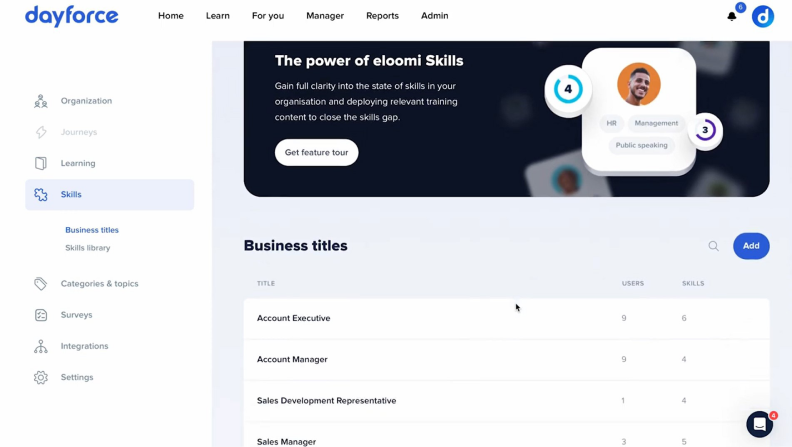
On the downside, some users note that the system might be somewhat slow and somewhat unstable. Also, pricing is not available on the website, and there is no free trial available either. To learn more about pricing plans, you’ll need to book a free demo.
What are the pros
of this HR LMS?
- User-friendly, clean interface
- The ability to create highly personalized learning experiences based on detailed insights
- Social learning features for better engagement
- Native HR integrations
- Responsive customer support
What are the cons
of this HR LMS?
- Might not be as fast and stable as its competitors
- Pricing is not transparent, and there is no free trial available
Pricing
The vendor offers a pay-per-user pricing model and two plans with different feature sets. However, there are no values on the website; you can only find out exact prices if you book a free demo. The trial period for this product is unavailable.
4. Tovuti LMS
Tovuti is one of the top-rated multi-purpose LMSs that can cater to HR needs for a wide range of companies. The platform is promoted as a scalable solution suitable for most industries and businesses of all sizes. Still, it might be the best fit for midsize businesses because of its capabilities and pricing.
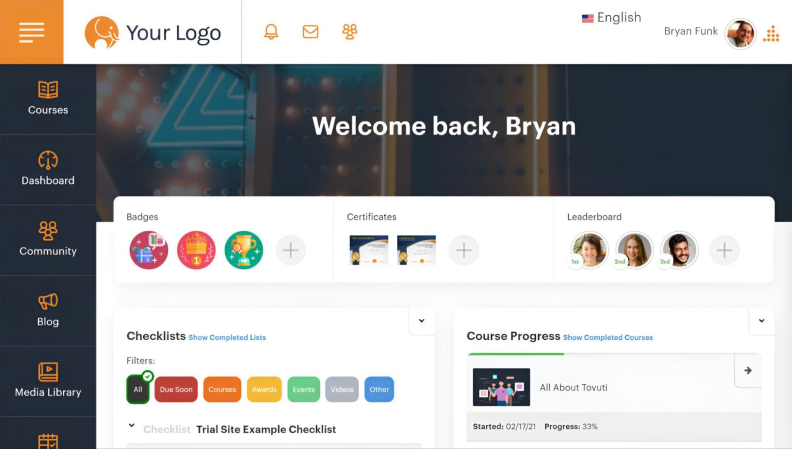
As an HR LMS, Tovuti has all the essential functionality, such as AI-assisted training content creation, assessment, certification, reporting, and analytics. It also provides good engagement and gamification, but advanced customization and personalization are the definite highlights. Another notable feature is the reference library for storing content.
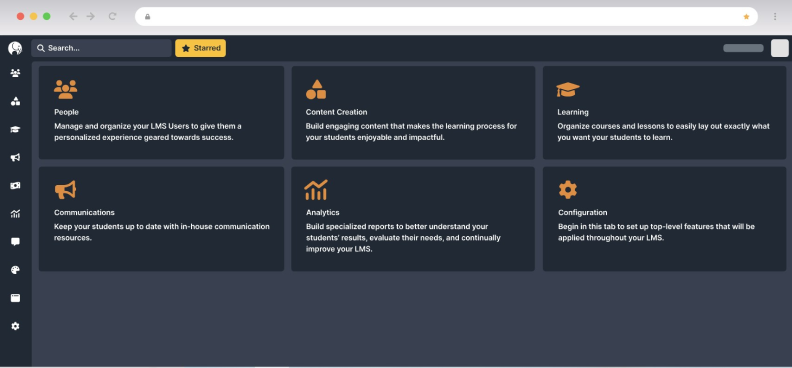
Pricing, however, is unclear. The official website only mentions custom quotes that presumably vary according to the number of learners and requests that you fill out a request form. You can also book a free demo.
What are the pros
of this HR LMS?
- Excellent customization and branding options
- Built-in tool for AI-assisted creation of training materials
- Advanced social learning tools for collaboration and engagement
- Allows for the creation of a reference library to store learning materials
- Supports a very large number of integrations
What are the cons
of this HR LMS?
- Some users note that the platform might be difficult to navigate and take time to get used to
- Pricing is only available upon request; no trial period is available
Pricing
The vendor offers custom pricing quotes, but detailed information is not available on the website. There is also no trial period, but a free demo is available.
5. Docebo
Docebo is another highly regarded LMS with robust features for handling any training initiatives in an organization. Because of its set of functions and high price, the platform works best as an enterprise-level HR learning management system. But it is also flexible enough to be an effective solution for smaller companies that can afford it.
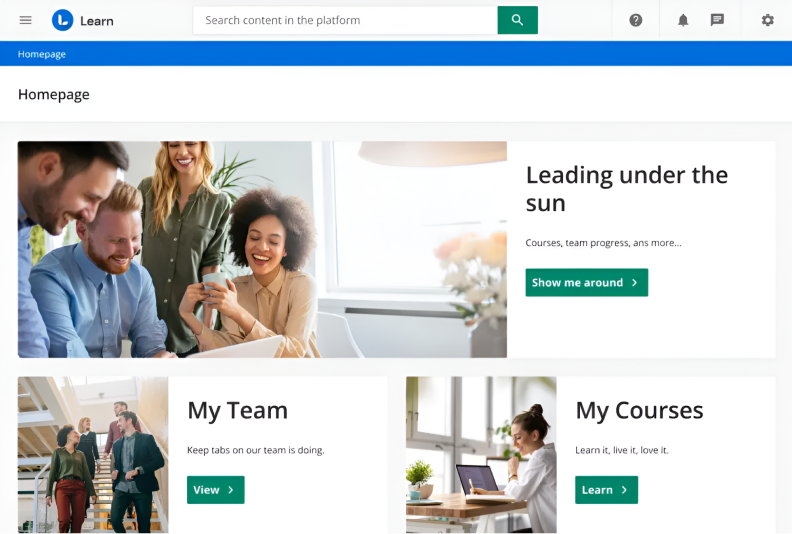
Having all the functionality necessary to handle the entire range of HR tasks and more, Docebo proves itself to be one of the most powerful LMS platforms. The flip side is that reviews frequently mention an overwhelming interface and a steep learning curve. But there is also plenty to enjoy, such as social learning experiences and the AI-powered Docebo Skills feature that automatically adjusts the choice of course materials to match each employee’s upskilling needs.
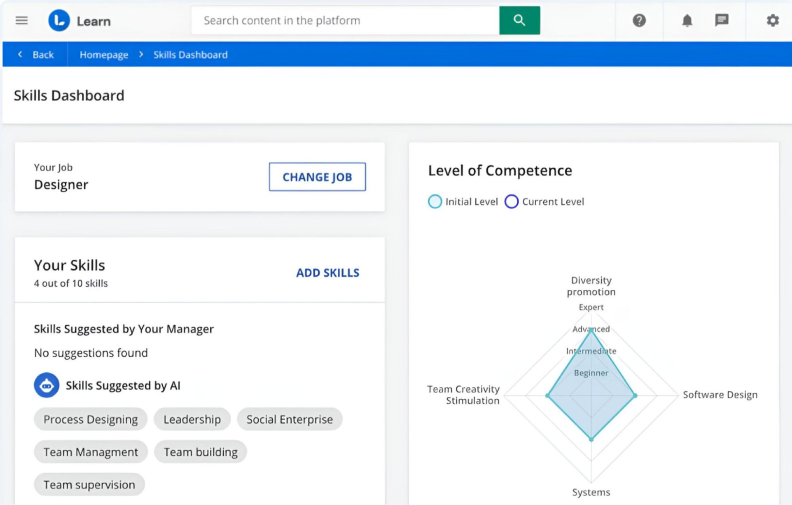
The pricing model, however, might be a pain point for many businesses. Even the lowest-priced plan starts at $25,000 per year, which means the LMS will cost you around $2,000 and up, plus there is no trial period available. It’s not the most affordable system, to say the least, but very big companies find it worthwhile.
What are the pros
of this HR LMS?
- Quick AI-powered training course creation
- Advanced engagement and gamification features
- AI-powered Docebo Skills feature for better performance management
- Detailed information on the official website and reliable 24/7 customer support
What are the cons
of this HR LMS?
- The user experience might not be as smooth as with more beginner-friendly platforms
- Pricing is on the higher end and might not be affordable for small and even midsize businesses; there is no trial version
Pricing
Pricing is based on the number of active users and the particular features you use. There are three plans available, starting with $25,000 per year on a three-year contract for the Engage plan. A trial is not available, but you can book a free demo to get more details. Also, some features are available for testing with an active subscription.
FAQ on HR LMS systems
What is an LMS in HR?
An LMS (learning management system) is a platform for managing digital learning. LMSs in HR help human resources departments automate routine procedures, such as onboarding and certification, as well as meeting learning demands, such as upskilling and reskilling. Due to their digital nature, HR LMSs are cost-effective, easily scalable, and quick to update.
What is the difference between an LMS and an HRMS?
An LMS is primarily focused on delivering, tracking, and assessing learning activities. An HRMS, on the other hand, is software designed to handle a wider array of HR tasks, such as recruiting, payroll, and attendance management. While HRMSs usually include some training functionality, they are often too limited to cover all employee learning and development needs.
Why do HR departments need LMS systems?
Professionals both value and need learning and development opportunities and tend to prefer employers that provide them. Businesses, in turn, are aware of the need to close skill gaps in the workforce. LMS systems help automate and optimize corporate learning and allow for delivering continuous learning with maximum ROI, thus making businesses more attractive to employees and enhancing the performance of HR departments.



